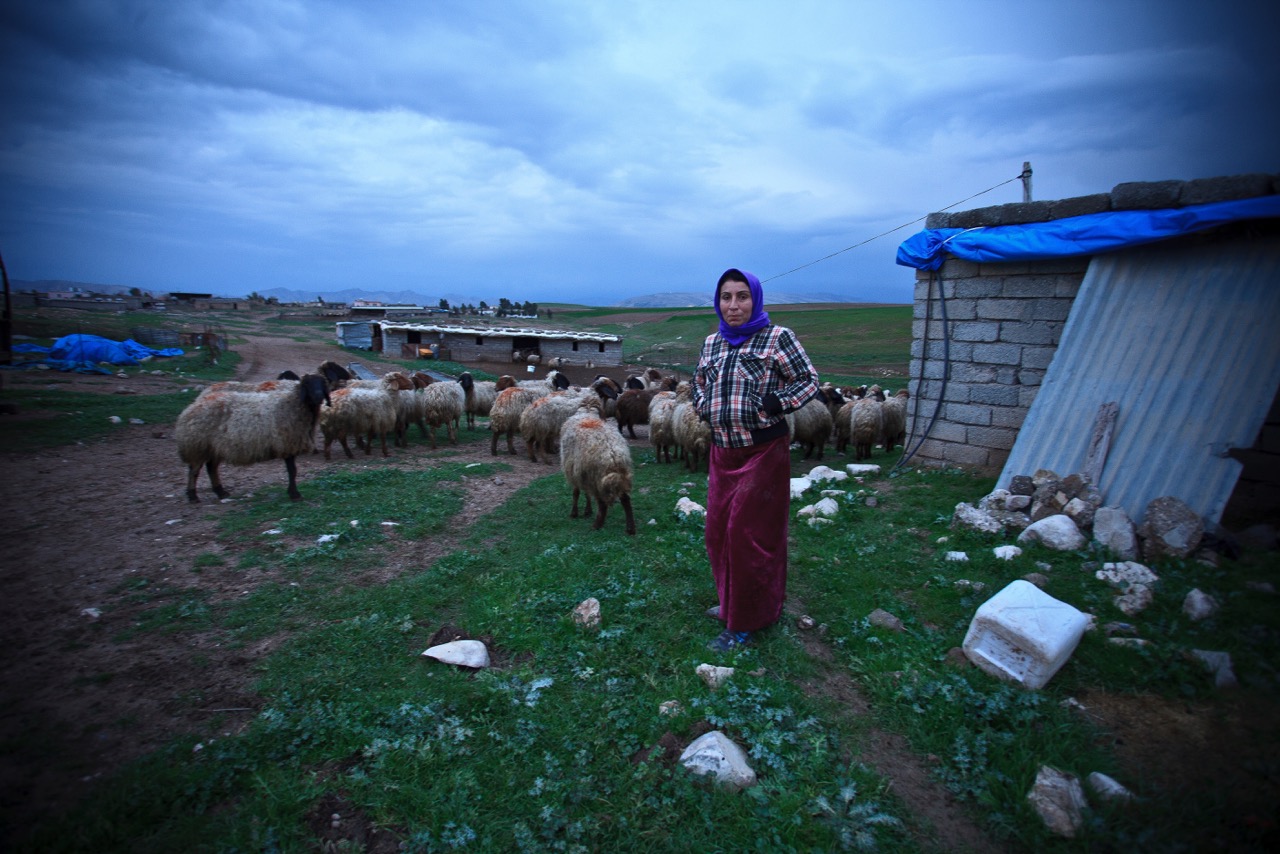In February 2016, the Belgian-born artist Francis Alÿs undertook a trip to Iraq facilitated by the Ruya Foundation in which he gave a workshop to artists in Baghdad, and visited refugee camps in the north of the country. He followed this with an extraordinary visit in November 2016 to the Mosul front line in the company of a Kurdish battalion, during the Liberation of Mosul offensive. A new installation based on his experiences in Mosul was unveiled at the Iraq Pavilion at the 57th Venice Biennale.
Below is an extract of a conversation between Alÿs and Chalabi that took place over several sittings, and on the road from Dohuk to Erbil. The full text was published in a brochure which is available at the Iraq Pavilion.

Tamara Chalabi and Francis Alÿs meet the priest at the Yezidi temple of Lalish, the holiest temple of the Yezidi faith. Photo: Akam Shex Hadi/Ruya Foundation.
TC: Can art be a catalyst for healing, reconciliation? What impact could you imagine having here?
FA: I ask myself this all the time!
TC: I ask myself every day!
FA: I think it’s only by doing it that you get a response. A friend in Afghanistan told me, “You do, you’re wrong; you don’t, you’re wrong.” That’s the tragic equation we have to deal with. But my position is that it’s always worth a shot. Now, can we give testimony to a traumatic event by means of a fiction, or a poem, to refer to Adorno’s haunting statement (“To write poetry after Auschwitz is barbaric”)? There are no guarantees of success. In Mexico they say, lo que importa es lo que logras (what you achieve is what matters), but then again the achievement rarely occurs where you expected it to happen… Referring to a specific case: when we did the project of moving a sand dune in Lima with a few hundred students equipped with shovels… When we got to the summit of the dune after a difficult and long climb, we suddenly realised that from the top we could see the sea just a few miles away. That sudden apparition felt like a collective hallucination and for a second it produced a sensation of the sublime. And of complete complicity.

Outside the old Yezidi village of Sina. Photo: Akam Shex Hadi/Ruya Foundation

Resident of Camp Shariya, the largest IDP camp in Iraq, shows Francis Alÿs a traditional clay oven. Photo: Akam Shex Hadi/Ruya Foundation.

Outside a school at Camp Kabarto. Photo: Akam Shex Hadi/Ruya Foundation.
What’s that city ahead of us?
TC: Erbil.
FA: Back already?
TC: Is this part of your Adrenalinotourism as you call it?
FA: (laughing) Probably. It puts you in propitious creativity. My brain seems to function better in situations of uncertainty. There is a quote by Clausewitz which says although our intellect always longs for clarity and certainty, our nature often finds uncertainty fascinating.
…Thinking of the past few days, it amused me how I was mistaken for a journalist!
TC: Have you been mistaken for a journalist before?
FA: Not really…
TC: Doesn’t it also tell you about what people here experience and see? It’s interesting that it’s the only thing they can imagine you being. You are here with a camera. It also tells you who comes here. They can’t imagine an artist.
FA: Yes, I see that, and when I look at my notes, with all these fragments of testimonies written down in a rush, they are far from being artistic annotations! Perhaps if I had come with an easel and paintbrushes it would have been different. Next time.
